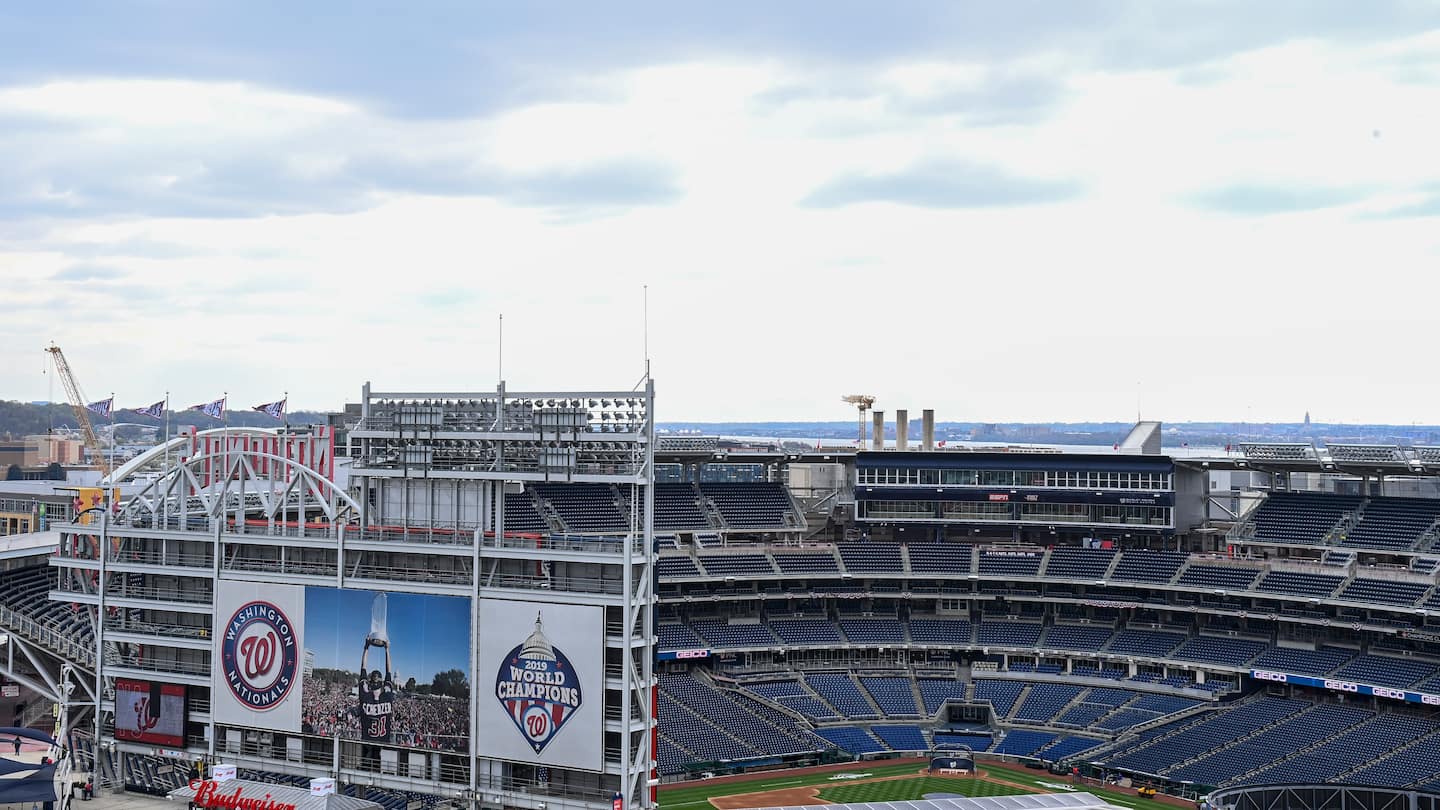Nationals-Mets opening series is postponed because of coronavirus concerns

The Nationals’ season was supposed to begin at 7:09 p.m. Thursday at Nationals Park. Uncertainty with their latest test results led to a postponement, which then led MLB to keep the club’s operations on hold. Now the Nationals are waiting for Thursday’s test results, which could come Friday night. If there are no new cases — aside from the “likely” positive the Nationals announced Thursday — they will inch closer to containing the spread. But if there are more positive tests, their immediate future gets even more complicated.
MLB has not announced when the three games will be made up. The Mets now will start their season at the Philadelphia Phillies on Monday. The Nationals are scheduled to face the Atlanta Braves in Washington that afternoon, but the status of that series is uncertain. Test results and any necessary contact tracing will determine when the Nationals can begin their season.
“Depending on what happens in the next day or so, we’ll be in contact with MLB and we’ll make the decision on whether we’re playing or not,” Nationals General Manager Mike Rizzo said Friday when asked about hosting the Braves. “But we are, as of right now, preparing to play Monday.”
Rizzo hopes MLB will clear the Nationals to work out in small, distanced groups Saturday. He believes a clean bill of results — no new positives Friday — could make that possible. Rizzo said contact tracing has been completed for the four individuals who have tested positive. That put four additional players in mandatory quarantine, which will last at least seven days, per MLB’s coronavirus protocol for this season. MLB requires at least 10 days of isolation for those who test positive and are symptomatic. Those isolation periods could grow based on D.C. regulations or if the staff member or any of the players stops testing negative.
The tricky part of curbing an outbreak is the incubation period between when the virus is contracted and when it starts showing up in tests. Kathleen Bachynski, an assistant professor of public health at Muhlenberg College in Allentown, Pa., said that is typically a five- to seven-day window. The Nationals are helped by having not gathered since arriving back in Washington on Monday night, meaning there has been a limited chance of exposure since then. But the timeline of their week still raises issues.
“We have to wait it out until we can have more confidence that we can trust the tests being negative or positive,” Bachynski said Friday, speaking generally about incubation periods and when results become reliable information. “Everyday testing is really good, but it doesn’t obviate the need for a five- to six-day quarantine. Because after those five days is when we can say, ‘Okay, now they are still testing negative, and this is when we would expect them to have a higher level of virus if they really had been exposed.’ ”
That is what MLB is weighing with the Nationals. Negative results on the second, third or fourth days after possible exposure don’t provide enough clarity to permit a return to action, according to medical experts and a person with knowledge of MLB’s thinking. An MLB official did not specify how many days without new positives are required to give Washington the green light, and a number is not listed in its protocol. The Nationals are testing daily — instead of the standard every-other-day model — because this is a potential outbreak.
The first positive for the Nationals was a player who was tested Monday morning at the team’s spring training site in West Palm Beach, Fla. That person, Bachynski said, was likely most infectious in the two days before and after the saliva test that later came back positive. After the test, and before the Nationals received the result, that player was around others at the spring training facility; on a short bus ride to a charter flight to Washington; on the charter flight; and on a longer bus ride from Dulles International Airport to D.C. Two people who were on the flight said mask-wearing was not entirely consistent, but Rizzo has repeated that the Nationals have followed all protocols.
“It could happen in many, many different ways,” Rizzo said when asked whether a positive test shows a hole in MLB’s regulations. “I don’t think it’s a breach of protocol or inadequate protocols, but it’s something that happened. We’re going to try to find out how it happened and investigate it and see if we can stop it from happening again.”
A mix of players, coaches, staff members and front-office personnel took the charter and buses. Three players, including pitcher Max Scherzer, chose to travel separately with their families. Initial contact tracing for the first positive led five people — four players and a staff member — into quarantine. Three of those players then tested positive on samples collected Wednesday afternoon. As Rizzo stated, the team is confident it has traced close contacts to each of those players and isolated them accordingly.
“The real-world expectations are that before you travel you get a test and then wait for the result,” Chrissie Juliano, executive director of the Big Cities Health Coalition, said Friday. “So you know, before you get on the airplane, that you’re not carrying covid. But now this is what it is.”
The reality, then, is that further testing is required to know the extent of the spread. That’s why more games were postponed Friday. And that’s why most of the organization, from the players to Rizzo himself, is in what he called “Mike Rizzo-mandated quarantine.”
On Thursday, Rizzo said all players at the team’s alternate site in Fredericksburg, Va., had tested negative. Whenever the Nationals play again, whether it’s Monday or later, a group of them will be needed to fill out the roster.






